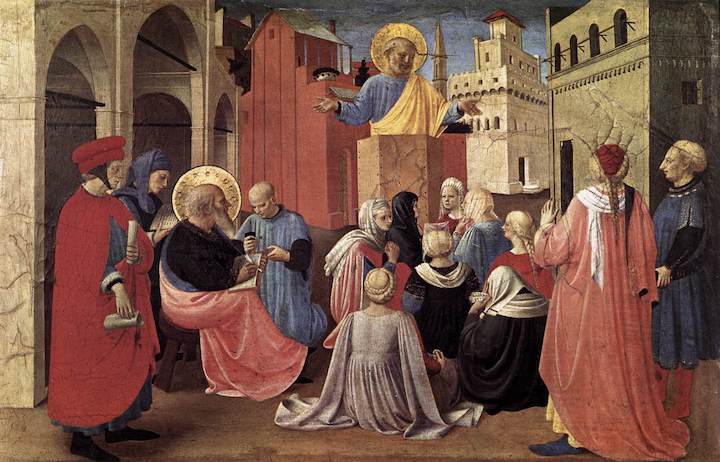Poor Saint Peter. The first pope’s first Urbi et Orbi address (so to speak) begins inauspiciously. He had to start, not with a bold proclamation of Christ, but with assurances that the disciples weren’t actually drunk. “You who are Jews, indeed all of you staying in Jerusalem. Let this be known to you, and listen to my words. These people are not drunk, as you suppose, for it is only nine o’clock in the morning.” (Acts 2:14-15)
The scene is more than a little amusing and deserves to be included in today’s First Reading – but not only for its humor. Saint Peter touches on an ancient and essential aspect of devotion to the Holy Spirit: sober inebriation. Perhaps he should have clarified that they were indeed drunk, but not in the manner that the crowds supposed. They had that sober inebriation of the Holy Spirit that Saint Paul would later encourage: “And do not get drunk on wine, in which lies debauchery, but be filled with the Spirit.” (Ephesians 5:18)
Saint Ambrose picks up on this theme and pens the verse: Laeti bibamus sobriam ebrietatem Spiritus – “Let us joyfully drink the sober inebriation of the Spirit.” As he instructs his people, “He who becomes intoxicated with wine staggers, but he who becomes intoxicated with the Holy Spirit is rooted in Christ. How truly excellent is this intoxication which produces the sobriety of the soul!” Here is an intoxication that leads not to stumbling and slurring, but to stability and clarity. We need to allow the Spirit to produce it in us.
As with any paradox, both parts of this must be held with equal strength. Inebriation that is not of the Spirit is debauchery or, at the very least, silliness. Sobriety without such inebriation is rigid and lifeless, lacking the freedom the Spirit gives.
Perhaps the most conspicuous feature of an inebriated person is joy. That squares well with the fruit that the Holy Spirit desires to produce in us, the distinctive joy of Christ’s followers. It is the joy of God himself that the soul possesses independent of circumstances and even amid great suffering.
This is what we encounter throughout the Acts of the Apostles, whose protagonist is the Church animated by the Holy Spirit. The Apostles leave the Sanhedrin “rejoicing that they were counted worthy to suffer dishonor for the name.” (Acts 5:41) The Spirit causes Paul and Silas to sing in the prison of Philippi. So it is throughout the Church’s history, in the lives of all given over to the Spirit. Saint Francis of Assisi and Mother Teresa rejoice in their poverty. As Paul and Silas did in Philippi; Maximillian Kolbe sings in the death chamber of Auschwitz.

We live in an angry, humorless age. And there’s plenty to be angry about. Still, even as everyone desires joy, most people settle for mere pleasure. Inebriated by the Spirit, Christians should display the joy that only He brings and that God desires for all.
Further, the inebriated man speaks freely – indeed, often too freely for polite company. There’s a carelessness to his words and actions. He’s unaware or unconcerned about what people think or say. He doesn’t fashion his words for their approval. So also all those led by the Spirit should speak with equal candor and with the same disregard for human respect. There should be a holy carelessness and even recklessness in speaking about the faith.
This doesn’t give us permission to be obnoxious or rude. There’s already enough of that going on. Rather, it gives us the courage to speak joyfully about the difficult and odd elements of the Faith, without trying to tailor them to the world’s thinking. In so doing, we find ourselves in good company – not only that of Peter and the Apostles on Pentecost but also of our Lord himself whose own family announced, “He is out of his mind.” (Mark 3:21)
But there is also a sobriety involved. This is not an inebriation that ruins lives and leads to regret. On the contrary, it brings greater sobriety, a deeper reasonableness, and a greater clarity of thought and word. In Ephesus, the artisans rioted against Paul and the other disciples who “who have turned the world upside down.” (Acts 17:6) Christianity had indeed upended the pagan world. But that was only to introduce a new way of thinking, no longer in keeping with human thought alone but in accord with divine wisdom. If this inebriation turns things upside down, it’s only to set them on more solid footing.
A further paradox of this sober inebriation is that it is purchased for us by our Lord’s sorrowful passion. In his own hour of sober inebriation, Christ gains the Spirit for us by shedding his Blood on the Cross. Thus this gift of the Spirit is associated with the Precious Blood of Jesus. “Blood of Christ, inebriate me,” we pray in the Anima Christi.
In the Votive Mass of the Precious Blood the priest prays after Communion, “that we may always be bathed in the Blood of our Savior, so that it may become for us a spring of water welling up to eternal life.”
At the altar today, where the shedding of His blood is re-presented, we pray that the Spirit produce in our souls that sober inebriation by which we bring to others the shocking joy of the Gospel that stabilizes the world.















